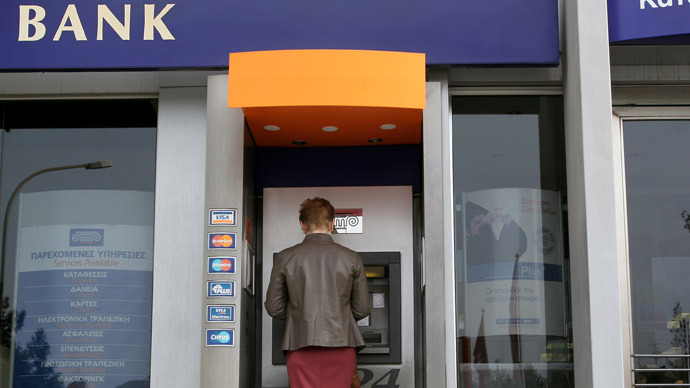European Parliament might shift bailout burden from taxpayers to depositors

A senior lawmaker told Reuters the Cyprus model may not be an isolated case, and is perhaps a future template in dealing with troubled European banks.
The new template is now likely to turn into a full-scale EU law, letting taxpayers off the hook in case a bail-out is needed, but imposing major losses on bigger savers on a permanent basis.
"You need to be able to do the bail-in as well with
deposits," said Gunnar Hokmark, member of European Parliament,
who is leading negotiations with EU countries to finalize a law for
winding up problem banks, Reuters reported.
"Deposits below 100,000 euros are protected ... deposits above
100,000 euros are not protected and shall be treated as part of the
capital that can be bailed in," Hokmark told Reuters, adding
that he was confident a majority of his peers in the parliament
backed the idea.
The European Commission has written the draft of the law, which now
awaits approval from eurozone member states and the parliament on
whether and when it can be implemented. It's been reported, the law
is planned to take effect in the beginning of 2015.
"What we've done last night is what I call pushing back the risks," Dijsselbloem told Reuters and the Financial Times hours after the Cyprus deal was struck Monday.
After speaking to reporters, news outlets prolieferated Disselbloem's 'Cyprus as a template' commentary, which sent markets into a spook and tanked many trading indexes. Analysts took the rhetoric as a signal Cyprus was not a unique case, and other Euro economies, could be next.
Now Dijsselbloem is eating his words and defended himself saying he doesn't even know the English word 'template', but he was simply describing the process itself.
"If there is a risk in a bank, our first question should be
'Okay, what are you in the bank going to do about that? What can
you do to recapitalise yourself?' If the bank can't do it, then
we'll talk to the shareholders and the bondholders, we'll ask them
to contribute in recapitalising the bank, and if necessary the
uninsured deposit holders," he said.
Though the word 'template' wasn't explicitly used, his comments still indicate he doesn't think Cyprus is a one-time deal.
The International Monetry Fund and German officials back the new template and see it as a more sustainable approach to battling the sovereign debt problems that spread like a virus in financially weak members of the eurozone.
Economist Yanis Varoufakis believes the situation in the rest of
the eurozone is not looking good after the “basic principle” of a
banking union and solidarity throughout the eurozone has been
jeopardized.
“As long as even a small probability of losing their money is
present and persistent, the capital flight from the periphery to
the core of the eurozone is going to continue unabated and this is
going to constantly undermine the integrity of the eurozone,”
Varoufakis told RT. “Suppose you are a depositor in Spain… Even
if there is a small probability in your mind that something similar
could happen with your insolvent Spanish bank, and they are
insolvent after all, why would you keep money in your Spanish bank
account and not transfer it to Frankfurt, to Deutsche bank, let’s
say? There is no reason why you shouldn’t transfer it to
Germany.”












